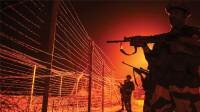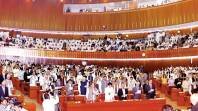The world-view of a large number of politically active people, including the ruling civilian and military elite, in Pakistan continues to be shaped by the Cold War politics of ideological divide and permanent political alignment. Most of them view all developments in domestic and international politics as the function of religion. The underlying theoretical formulation is Islam versus the non-Muslim world, led by the U.S. This is a recasting of the Clash of Civilization thesis. The widely shared world-view among the Political-Right and Islamists is that Pakistan is threatened as a Muslim country by the U.S., India and Israel. Of late, some Pakistani analysts have talked of a possible arrangement between the U.S., India and Iran against Pakistan.
The perception that there is an inherent hostility between Islamic Pakistan and the non-Muslim world and that many powerful states are out to destroy Pakistan creates the persecution mindset which builds hostility towards non-Muslim countries, especially the U.S. and India. This also creates isolationist disposition in Pakistan and a strong desire to cut-off links with other states perceived to be hostile towards Pakistan.
A large number of people in Pakistan’s political class maintain that the exit of U.S./NATO troops from Afghanistan by the end of 2014 will end militancy and terrorism in Pakistan after their main grievance of American military presence is removed. This is a naïve view and shows a lack of knowledge of how the terrorist and insurgent groups function.
Pakistan is not the only country in the world where some groups challenge the writ of the state or want to overwhelm the state structure. The experience of other countries shows that once such groups come into existence these continue to function even if the original reason is partially or totally removed. These groups develop a sense of power and find it difficult to give-up the habit of violence and new justifications are evolved. Insurgencies and challenges to the state authorities come to an end either when one party loses to the other or the competing entities come to a political understanding.
Dialogue is an option for coming out of internal conflict situation. However, dialogue is possible only when both sides come to the conclusion that none can get a clear victory and that the situation is stalemated. The other chance of dialogue is when one competing entity perceives its defeat or total elimination.
The possibilities of a political settlement between the government of Pakistan and Tehrik-i-Taliban-i-Pakistan (TTP) are minimal because the TTP does not feel stalemated in its efforts to project its power in the tribal area and mainland Pakistan. It appears quite confident that it can pursue its agenda of implementing its perception of the Sharia rule and world-view because it is not only entrenched in the tribal areas but it has also developed strong linkages with the militant groups in mainland Pakistan. These linkages have strengthened Punjab-based militant and sectarian groups but also helped the TTP to spread its network in mainland Pakistan. This networking and spread of the TTP activists in mainland Pakistan enables the TTP to count on sympathy, if not support, for its political agenda in mainland Pakistan. This is coupled with the ascendancy of the political parties in Pakistan that have Rightist-Islamist orientations in Pakistan (i.e. PMLN, PTI and their allies). All this makes it difficult for the civilian government to adopt a tough policy towards the TTP and other militant groups.
Pakistan’s federal government is leaning backward to bring the TTP to the dialogue table. The Taliban have set-out pre-conditions for the Talks rather than starting the dialogue and raising these demands. This shows that the TTP is not in any hurry to start a dialogue with Pakistani government.
The TTP does not think that it is losing against Pakistan’s state apparatus. The TTP leadership also thinks that given its linkages with the mainland groups and the Right-Wing/Islamist orientations of the federal government, there is an inbuilt pressure on the civilian government for not going for a tough action against the Taliban. As long as the ground political realities do not turn against the TTP, it will not avail of the federal government’s offer for talks.
Army top brass are looking towards the civilian government for seeking a political solution of the Taliban problem. The Army cannot sit back for an indefinite period for the civilian leaders to continue toying with the notion of dialogue. Perhaps, it can wait for three-four months. If nothing comes out of the dialogue what would be its disposition? The Amy may be inclined to go for security operation in the tribal areas to secure the region before the end of 2014. It would seek the cooperation of the civilian government for backing-up the security operation. Without the availability of full political support the Army may be reluctant to go for security operation. This kind of divergence can cause strain in civil-military relations.
The federal government faces another serious challenge. The militant and sectarian groups based in Punjab have developed strong links with the TTP in the tribal areas. The TTP can encourage these groups to resort to sectarian violence in Punjab to cause internal instability. The TTP can directly launch attacks in Punjab. All this will be done to divert the attention of the federal government from the tribal areas to security issues in Punjab.
If Pakistan cannot contain the TTP and other militant groups either by talks or by security action before the end of 2014, it will face greater problems after most of U.S./NATO troops are withdrawn from Afghanistan. If the Afghan Taliban gain strength in southern Afghanistan, Pakistani Taliban will be more confident for challenging the Pakistani state and if, Pakistan’s military takes action against them, they can easily cross over to Afghanistan.
Pakistan should facilitate the political dialogue between the Afghan Taliban and the Kabul government and discard the idea of influencing politics in Afghanistan through proxies, i.e., militant Islamic groups.
The dominant discourse on international politics in the political class in Pakistan runs counter to the new trends in international politics. Self-cultivated hostility towards the rest of the world, especially the U.S., and a strong steak of isolationism will push Pakistan to the back-lanes of global politics. The imperatives of global politics demand that Pakistan must continue to engage with the rest of world in a positive and friendly manner and pursue prudent diplomacy that can help Pakistan to revive its troubled economy, overcome energy shortages and control terrorism, militancy and religious extremism.
The writer is a renowned defense and political analyst, based in Lahore.
























